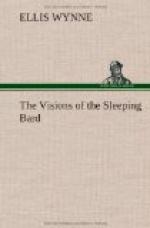Thence we went where we heard a loud noise, beating and clamouring, crying and laughing, shouting and singing. “Well, here’s Bedlam and no mistake,” quoth I. By the time we got in, the turmoil had ceased; one man lay like a log on the ground, another was vomiting, another nodding his head over a hearth full of battered flagons, and broken pipes and mugs. On enquiring, what should it be but a carousal of seven thirsty neighbours—a tinker, a dyer, a blacksmith, a miner, a chimney-sweep, a bard, and a parson who had come to preach sobriety, and to show in his own person how repulsive drunkenness is; and the beginning of the recent altercation was a discussion and dispute they had as to which of the seven callings loved best the pot and pipe; the bard had beaten all but the parson and, due regard being observed for the cloth, he was adjudged victor and worthy to be leader of his good comrades, and so the bard wound up the discussion thus:
“Where can ye find such thirsty seven,
“Search every clime and land?
“And quaffing off the ruddy ale,
“Bard and parson lead the
band.”
Thoroughly tired of these drunken swine, we drew nearer the gate in order to spy out the blemishes in the magnificent court of Love, the purblind king, wherein it is easy to enter, but difficult to get out again, and where are chambers innumerable. In the hall opposite the door stood giddy Cupid, with two arrows in his bow, darting a languishing venom called lust. Along the floor I saw many fair and comely women walking with measured steps, and following them, wretched youths gazing upon their beauty, and each one begging a glance from his mistress, fearing a frown even more than death; now and then one, bowing to the ground, would place a letter in his goddess’ hand, and another a sonnet, the while in fear expectant, like schoolboys showing their task to the master. They in return would favour their adorers with a simpering smile or two, just to keep their desires on edge, but granting nought more lest their lust be sated and they depart healed of the disease. Going on into the parlour I saw them having lessons in dancing and singing, with voice and hand, in order to make their lovers sevenfold madder than before; on again into the dining hall where they were taught coy smartness in eating; into the cellar, where potent love philtres were being mixed of nail parings and the like; in the upper rooms we could see one in a secret chamber twisting himself into all shapes, practising gentlemanly behaviour when in his mistress’ presence; another before a mirror learning how to smile correctly without showing his teeth too prominently to his ladylove; another preparing his tale to tell her, repeating the same thing an hundred times. Wearied with this insipid babbling we came to another cell: here a nobleman had sent for a poet from the Street of Pride to indite him a sonnet of praise to his angel, and an eulogy of himself; the bard was discoursing of his art:




